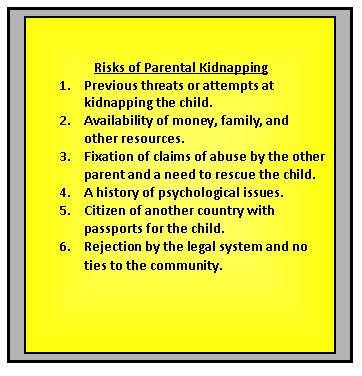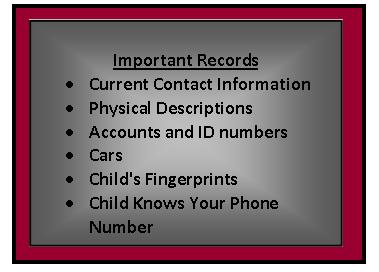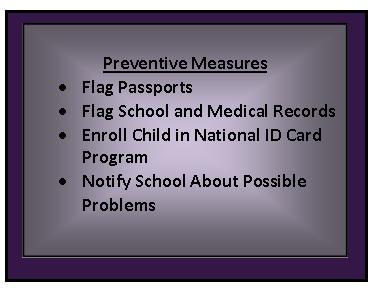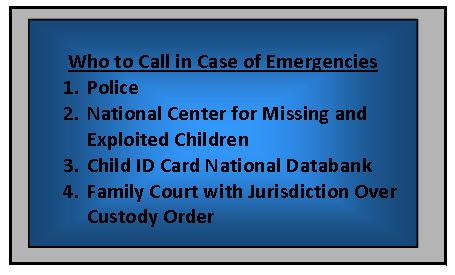Preventing Parental Kidnapping

By Joan Whetzel
To any parent who is going through a divorce, or who has gone through one, the thought of never seeing his or her child(ren) again is unbearable. Custody laws – set up to keep both parents in a child’s life - vary from one State to the next. But taking a child in violation of a custody order is a crime, no matter what State you live in. Any threat to take a child to prevent the other parent from seeing that child again, even if the threat was only said in anger or under stress, should be taken seriously.
What Is Parental Kidnapping?
Parental kidnapping occurs when one parent takes a child, hides a child, or otherwise keeps a child away from the other parent, in violation of a custody order, and it’s considered a crime in any state. Besides being a crime, the act of keeping the child away from the other parent combined with life on the run will have a detrimental effect on the child.
Parental kidnapping may be sudden and unexpected, where the non-custodial parent takes the child without warning. Or it may occur during a time when that parent has visitation under the custody order, or has permission to travel with the child, but never returns the child at the scheduled time.

Risk Factors for Parental Kidnapping
If a parent feels there may be a risk that their child will be kidnapped by the other parent, he or she must be on guard, ever watchful for the signs that such a kidnapping will occur. There are six key signs that a kidnapping is likely.
- The other parent has threatened to kidnap the child, or has actually carried out a kidnapping. This risk is usually combined with one or more of the other risk factors, which greatly increases the likelihood of an imminent parental kidnapping.
- The other parent has money, family, and other resources that would make it easier to disappear with the child.
- One parent strongly suspects that the other parent may be abusing, molesting, or abusing the child, as do other friends and family members. The authorities may not have taken the fears of abuse seriously, though, due to a lack of evidence. Any parent who has fixated on claims of any perceived abuse by the other parent, may believe that he or she is “rescuing” the child.
- A parent threatening to kidnap the child may have psychological issues – i.e. paranoid delusional or severely sociopathic – and firmly believes that the other parent is harming the child. These parents also feel the need to “rescue” the child, or they believe that they believe that they are a far superior parent and that the other parent will never be good for the child.
- The parent at risk of kidnapping the child is a citizen of another country with strong ties to that other country. This makes it far easier for him or her to take the child out of the country to visit family, and simply never return.
- One parent feels isolated by the legal system, meaning that he or she feels that the legal system is working for the other parent. This parent may also be separated or alienated from family or any other social support system. With no ties to the community, it is extremely easy for this parent to walk off with the child, because no one would notice their absence or know where they went.

What You Need if You Suspect an imminent Parental Kidnapping
Just as accusations of molestation or abuse will not be taken seriously without evidence, fears of parental kidnapping will not be taken seriously for the same reason. Above all else, when a parent fears parental abduction by the other parent is possible – no matter how remote the possibility – that parent should start collecting evidence to support his or her fears.
Evidence includes any letters, emails, text message sent by the other parent, as well as any voice mails and phone messages recorded on an answering machine. Make sure that others are with you when you make exchanges according to the custody order. Also having more than one witness to conversations between the two of you (especially when they involve threats of kidnapping) may provide you with several witnesses that can support your claims. Other documentation that may support your fears of abduction include the custody order, copies of communications with the school, any documents from repeated attempts to take you to court, police reports from all of his or her calls to the police, and any records from his or her attempts to turn you in to CPS.
With this evidence in hand, the police and the courts will need further information in order to locate the other parent:
- Current contact information for the other parent, their family and friends (if you know this information), and their job.
- Physical identification about the other parent and the child, including a physical description and color photos.
- Other identifying information about the other parent and the child: social security numbers, bank information, driver’s license, their car’s make, model, and license plate number (if you know it).
- Have a set of your child’s fingerprints on file with the local police department.
- Teach your child to use the phone and have him or her memorize your name, phone number, and address.
If your suspicions are strong – and you can afford it – consider hiring a private investigator who is experienced in child abduction cases. The investigation should be hired during the other parent’s visitation period, to observe without interfering with the visitation.

Preventive Measures
There are a few preventive measures you may need to consider if your suspicions – and your evidence – for possible parental kidnapping are strong. You may need to consider:
- Obtaining a restraining order to prevent the other parent from leaving the state with the child without permission.
- Flagging passports.
- Notifying the school about the possibility, and if the other parent lives in another state, updating the records so that the only people allowed to sign the child out of school is you and one other trusted person.
- Flagging school records, birth records, and medical records so that both parents have to sign before the records can be released.
- Get a child identification card for your child, available through any police department, that is tied to a national database designed to help find the child quickly. Make sure to keep the records updated every few months.
- If there’s a potential for lethal actions on the part of the other parent, file an emergency ex parte hearing for psychiatric screening and ask for a Guardian ad Lidem to represent your child.

What You Can Do if These Measures Fail
If the above measures fail, and your ex successfully kidnaps your child, there are several things you should do immediately.
- Call the police in your town and in the town where your child was visiting with the other parent.
- Contact the NationalCenter for Missing and Exploited Children at 800-843-5678.
- Contact the national databank that holds the records for your child’s ID card.
- Contact the Family court that has jurisdiction over your custody order and file whatever complaints necessary to capture the other parent quickly. You may need a lawyer to help you with this one.
- Seek counseling to help you deal with the kidnapping and the fallout.
Resources
US Legal. Parental Kidnapping.
http://definitions.uslegal.com/p/parental-kidnapping/
Family Law Library. Custodial Interference.
Juvenile Justice Bulletin. Early Identification of Risk Factors for Parental Abduction.
http://www.missingkids.com/en_US/archive/documents/risk_factors_parental_abduction.pdf
Divorce Net. Parental Kidnapping: What It Is and How You Can Prevent It.
http://www.divorcenet.com/resources/child-custody/parental-kidnapping-what-is-it-and-how-can-you-pre
LauraRecoveryCenter. Texas Law on Parental Abduction.
Women's Law. Parental Kidnapping.
http://www.womenslaw.org/laws_state_type.php?id=11730&state_code=TX







